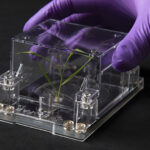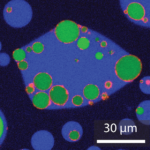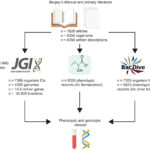Berkeley Lab scientists from the Applied Mathematics and Computational Research (AMCR) and Environmental Genomics and Systems Biology (EGSB) Divisions developed RhizoNet, which harnesses the power of artificial intelligence (AI) to automate the process of root image analysis with exceptional accuracy.
Machine Learning Uncovers New Targets for Plant Engineering
Machine learning has a variety of applications in scientific research, from rapidly analyzing datasets to making predictions. At the Joint BioEnergy Institute (JBEI), researchers are using machine learning to find new proteins that play a role in plant gene expression — providing the scientific community with new avenues to explore in bioenergy crop engineering.
Two Scientists Join Ranks of AAAS Fellows
Two senior scientists in the Biosciences Area, Jian-Hua Mao and Trent Northen, are newly named Fellows of the American Association for the Advancement of Science (AAAS).
Toward Engineering Cell-like Factories
Cheryl Kerfeld’s laboratory, which operates at both Michigan State University and Berkeley Lab, teamed up with researchers at Pennsylvania State University and the University of Delaware to take a first step toward creating artificial cells that lack a lipid membrane.
Finding the Fermenters
Most organisms use oxygen to convert food into energy. However, in environments with little or no oxygen, life had found other ways to produce energy, using a process called fermentation. To better understand the range of bacteria and archaea that rely on this form of metabolism, researchers at UC Davis and UC Santa Barbara recently compiled a list of with more than 8,300 organisms from multiple sources, including the DOE Joint Genome Institute (JGI) and the DOE Systems Biology Knowledgebase (KBase). The researchers also built an interactive browser that allows other researchers to study the genomes and predict the metabolic abilities of microbes that are likely to thrive in environments with little or no oxygen.
- 1
- 2
- 3
- …
- 45
- Next Page »
Was this page useful?








